Recent studies have shown how supplementing L-Arginine in the early stages of gestation, favors: embryos’ survival, the number of births and the weight at weaning.
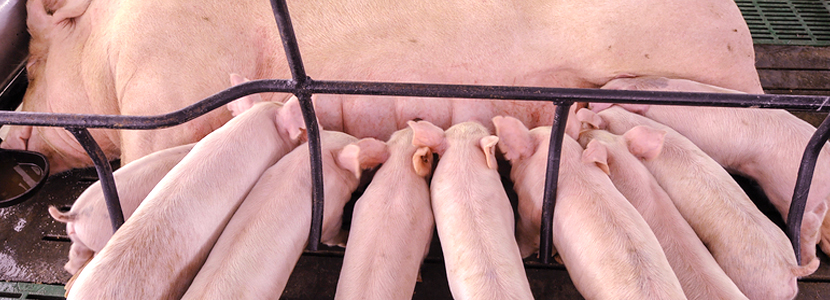 28 Sep 2022
28 Sep 2022
Effect of L-arginine supplementation in pregnant sows
Modern genetic sow lines are characterized by high prolificacy. However, this is detrimental to the litter’s homogeneity, presenting a high percentage of piglets with low birth weight (<1kg).
Prolificacy has a positive correlation with morbidity and mortality rates during the birth-weaning period. In addition, hyperprolific sows often have problems regarding colostrum and milk production, affecting its quantity and quality.
Adequate vasculogenesis and angiogenesis are necessary in piglets’ fetal development to ensure blood circulation of the placenta. This is essential for the proper development of fetuses as well as for a reduction in embryonic mortality rates
Sexually mature sows gestate a relatively low number of piglets (approximately 8.5 piglets per litter) when fed diets without Arginine. This is due to their ability to synthesize the necessary amounts of this amino acid.
However, this endogenous synthesis can be modified in hyperprolific sows.
Recent studies have shown how supplementing L-Arginine in the early stages of gestation, favors: embryos’ survival, the number of births and the weight at weaning.
In turn, the addition of L-Arginine in the final stages of gestation reduces the percentage of stillborn and underweight piglets (Nuntapaitoon et al. 2018).
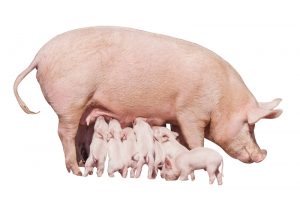
On the other hand, arginine is a precursor of numerous physiological processes such as lipid metabolism in gestation and the production of polyamines and nitrous oxide which are necessary in placental angiogenesis.
It has been hypothesized that arginine can modify the intestinal microbial profile, as observed in mice supplemented with this amino acid (Ren et al. 2014).
It is increasingly evident that the intestinal microbiota is capable of modulating the physiological development and health status of sows, preventing colonization by pathogenic bacteria in piglets.
However, whether arginine supplementation in gestation diets has an impact on the composition of the sow’s microbial flora and therefore on the first days of piglets’ lives, remains unknown.
Objective
The objective of the following study was to verify the efficacy of diets enriched with arginine. Evaluating its influence on:
Materials and methods
The trial was conducted at a commercial farm located in Italy. 205 Landrace Large White bristles were used.
The experiment was carried out using a 2×5 factorial design, in which there were 2 diets and 5 sow classes. The sows were divided into two experimental groups, balanced by the number of piglets:
Results [register]
Table 1 shows the effects of the diets used for the trial. The inclusion of arginine did not significantly affect the number of stillborn, mummified and dead in the birth-weaning period.
The ARG treatment presented a trend in regards to improving the number of live births (p = 0.086) and in fewer deaths between days 0 to 3 of life (p = 0.088). The number of total piglets born in the ARG group was higher than in the CON group (p = 0.043).
Table 1. Effect of CON and ARG treatments on pregnant sows

Source: D. Luise., et. al, 2022
Figure 1 shows the effect of the applied treatment on the percentage of piglets with intrauterine growth retardation (IUGR). Piglets were classified according to growth, as follows: Nomal, Slight and Moderate.
Arginine supplementation tended to reduce the percentage of piglets with “slight” retarded growth. In turn, the treatment also reduced the total number of stunted pigs.
Figure 1. Percentage of piglets with delayed intrauterine growth (slight), moderate (moderate) and total, with the DIETS CON and ARG.
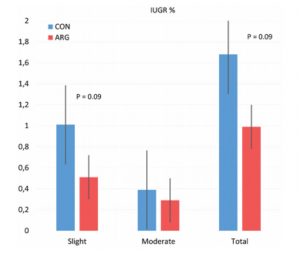
Source: D. Luise., et. al, 2022
The obtained results suggest that arginine supplementation did not affect sows’ intestinal eubiosis. Therefore, it can be assumed that it did not affect the environmental microbiome in which the newborn piglets were born and raised.
Discussion
The present study demonstrates that supplementing 0.25% arginine in a commercial gestation diet (with a total arginine concentration of 0.97%) improves the total number of born piglets. While also tending to improve the number of live born piglets. All of these, are parameters of great economic relevance within pig farms.
The effect of arginine supplementation can be attributed to the influence of this amino acid on the synthesis of nitrous oxide and polyamine. These are considered key factors in placental angiogenesis and vascularization, allowing fetuses to obtain sufficient oxygen and nutrients for their development.
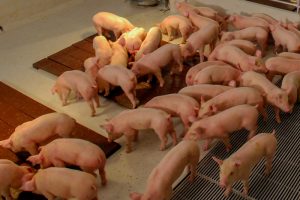
Considering that a positive trend was observed in the present trial for the number of live born pigs per sow, it could be assumed that arginine supplementation affected the functional capacity and vascularization of the placenta.
In the present study, it was observed that the AGR group tended to reduce the percentage of IUGR pigs. Fetal growth restriction has a negative effect on newborns, leading to a high mortality rate before weaning for most moderate and severe IUGR pigs (Hales et al. 2013).
Amongst the factors that have been associated with IUGR piglets, including the mother’s genetics and the number of births (Matheson et al.2018), proper maternal nutrition during gestation plays a crucial role.
Supplementation with Arg did not change the weight of piglets, either at birth or at weaning. The effect of arginine on the reproductive performance of sows in terms of the weight of piglets is controversial:
This variation between studies can be explained by the difference in the amount and duration of arginine supplementation during the gestation period.
In the mentioned study, although arginine supplementation was included throughout the gestation period, the control group had a relatively high amount of arginine (0.72%); therefore, the lack of effect could be due to the fact that there was not much of a difference in regards to arginine levels between the two groups.
Although the average weight of piglets was not different between diets, the present study evidenced a tendency towards a reduction in piglet mortality during the first three days of life. Previous studies suggested the absence of an effect attributed to L-arginine on mortality prior to weaning.
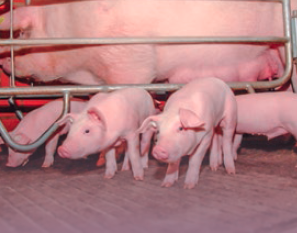
In contrast, Hines et al. (2019), showed that the same inclusion levels for supplemented Arg from day 15 of gestation until calving reduced piglet mortality after weaning.
Therefore, the influence of Arg supplementation in regards to reducing piglet mortality is still unclear and its response varies depending on the dose and supplementation period.
Diet, along with additional factors such as host genetics and environment, represents one of the main factors capable of rapidly modifying the microbial profile.

Although the microbial structure was not profoundly affected, some bacteria that are common in the intestinal microbiota of sows were influenced by L-arginine supplementation.
Arginine supplementation increased both the family Bacteroidaceae and the genus Bacteroides.
The present observation concurs with the results obtained in the study carried out by Wu et al. (2011). They observed that a greater abundance of this bacterial family was associated with diets with high levels of animal protein and amino acids in humans. Which suggests that this bacterial family uses such sources of protein and amino acids for their metabolism.
In addition, in the present study, arginine reduced several bacterial families (Succinivibrionaceae, Acidaminococcaceae, Veillonellaceae) and bacteria of the genus Succinivibrio.
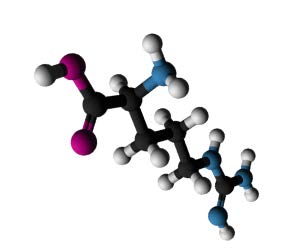
The reduction of Succinivibrio in the ARG group could be associated with the limited L-arginine use of these bacteria as suggested by Dai et al. (2010).
Conclusions
Supplementation of 0.25% arginine in sow diets throughout gestation increased the productive yield of sows in terms of the number of born piglets per sow. It also reduced the frequency of IUGR piglets and piglet mortality, without modifying the sow’s intestinal microbial structure nor its intestinal eubiosis.
These results reaffirm the key role that arginine plays within the nutrition and physiology of pregnant sows.
Source: Abstract taken from “Contribution of L-Arginine supplementation during gestation on sow productive
performance and on sow microbial faecal profile”,Luise, et.al(2020) Italian Journal of Animal Science
[/register]
Subscribe now to the technical magazine of animal nutrition
AUTHORS

Nutritional Interventions to Improve Fertility in Male Broiler Breeders
Edgar Oviedo
The Use of Organic Acids in Poultry: A Natural Path to Health and Productivity
M. Naeem
Synergistic Benefits of Prebiotics and Probiotics in Poultry, Swine, and Cattle
Gustavo Adolfo Quintana-Ospina
Hybrid Rye Potential in Laying Hen Feed Rations
Gwendolyn Jones
A day in the life of phosphorus in pigs: Part I
Rafael Duran Giménez-Rico
Use of enzymes in diets for ruminants
Braulio de la Calle Campos
Minerals and Hoof Health in the Pregnant Sow
Juan Gabriel Espino
Impact of Oxidized Fats on Swine Reproduction and Offspring
Maria Alejandra Perez Alvarado